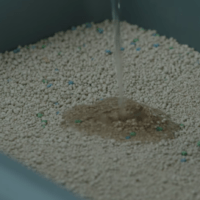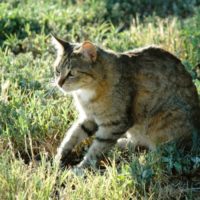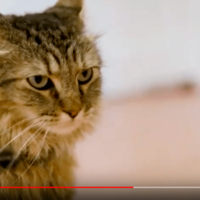Does My Cat Love Me? 7 Signs of Cat Love and Affection
“Does my cat love me?” A question every cat owner asks at times!
Dr Jo Righetti, cat behaviourist, lets you know the signs that your cat loves you...
Yes, our cats do love us!
Our cats do love us but we need to work a little harder than we do with their canine companions. Not only do we need to earn their feline affection but we need to learn to decipher their signs of love and affection.
The following 7 signs of cat love and affection will help you decide if your cat loves you.
1. Your cat wants to be with you.
When your cat has bonded to you they will often simply spend time with you around your home, perhaps following you from room to room. Go to bed and your cat is with you. Go to the bathroom and don’t expect to go alone!
Lots of cats like to ‘work’ with their owners, especially on their desk and preferably on top of their computer or laptop. This pretty much guarantees attention!
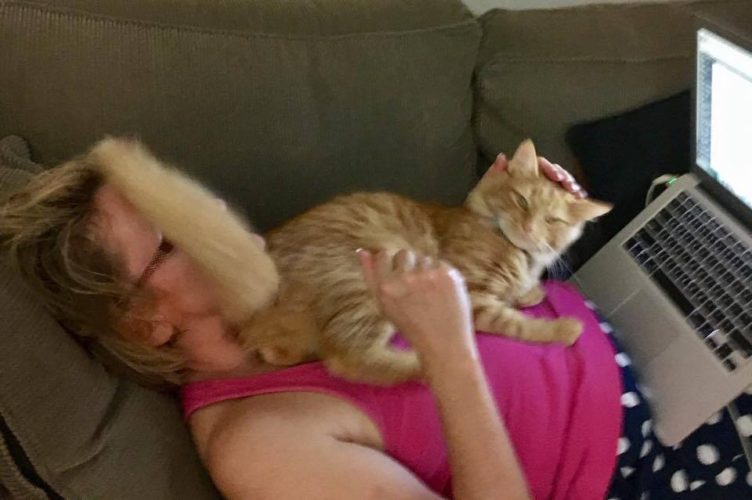
Every cat is unique and we have to appreciate that. My cat Wildfire like to come with me to the room that I do my exercise and stretches. He stretches with me! My other cats tend to disappear and amuse themselves elsewhere when it’s exercise time.
Read how to exercise with your pet
5 Reasons why pets follow us around
Your may occasionally wonder if your cat may just be looking for their next meal, and cats do like to eat often, but following you around your home is a sign that your cat wants to be with you. It must be love!
When cats, in a research study, were given the choice of spending time with humans, food, scent or toys; their number one choice was human interaction. This was followed by food, toys and only one preferred a scent stimulus. It did not matter if cats were owned cats or shelter cats. For both, humans were their preferred choice.
This shows us that cats want to interact with us. The ongoing evolution of domestication ensures that cats will bond to us, given the chance.
What your cat wants you to know about their eating habits
2. Your cat wants to sit or sleep beside you
Your cat has the choice of many places around your home to relax. And they probably sit in many different places or choose one place for a month, then move on. When you are sitting down relaxing and your cat chooses to come and sit beside you or even on you, this is a sign of your cat’s affection.
If your cat chooses not to sit with you, you may be able to encourage them by siting close, giving your cat a blanket to sit on, then gradually moving the blanket closer to you. In time, you can move the blanket on to your lap. Some cats, however, will never be lap cats and we should just enjoy some peaceful time near them.
Many cats like to spend the night with us too. This keeps them warm and they are aware of all your movements, should you choose to get up overnight. Unfortunately many cats also like to wake up at the crack of dawn – or before! Cats allowing us to be part of their nocturnal activities is probably a sign of love and affection – feline-style!
Cat Waking Up: Nocturnal activity of our feline friends
3. Your cat misses you when you are gone
We think of dogs as being our faithful friends but many cats also miss their human companions. While we don’t want our cats to fret when they are alone, and separation anxiety can be a problem with our pets, it is nice to know that they actually notice our absence.
Video footage of cats who dislike being alone, shows them pacing and crying after their owners have left. Fortunately these cats are the minority. Most cats will settle down to a nap or three when we leave them alone.
We don’t want our cats to be stressed, so it is best to get them used to being alone gradually and to leave then with something positive to do – toys or food that we vary over the days. Read more about separation anxiety if you are worried about your cat missing you.
We should value the independent nature that our cats also have. This may have non-cat lovers thinking they are aloof creatures but cat owners know better. Cats just like to do things on cat terms!
Reducing separation anxiety in pets
Reducing stress and anxiety in cats
Cats, unlike dogs may not run to the door to greet you when you come home, although some do. Cats will acknowledge you with a flick of their ears when you get home or come back into a room. You may need to look closely to spot this sign but take it as a sign of feline affection.
More Pet Q&As on Pet Problems Solved YouTube Channel
4. Your cat gazes affectionately at you and might even wink at you
Cats like to watch us. They watch us as we move around our home. They watch us as we eat dinner or talk to our friends on the phone. But there is nothing like the cat who sits beside you, maybe even on you and gazes into your eyes. You feel the love!
Gaze back at your cat and give them the occasional blink or wink. This signifies that you are relaxed and accepting. They may give you the feline blink or wink back.
Learn your cat’s body language signs of being happy and also signs of not being so happy. They may be more subtle than a dog’s over-the-top gestures but that’s often why cat owners enjoy their feline friends.
5. Your cat rubs up against you
Cats like to place their scent around their home, so you find see them rub up against chair legs, sofas and even you. Cats have scent glands around their body and rubbing against your legs ensures their scent will be on you. They have claimed you!
Of course, many cats scent mark your home by scratching too. This is hopefully done on scratching posts but furniture is a favourite scratching item too.
One other way cats mark and get their scent around them is to toilet or spray but this is not a preferred method of communication by owners!
Cat scratching behaviour: Preserve your furniture
Cat toileting behaviour: Stop unwanted peeing, pooing or spraying behaviour
Another way to getting scent on to you is the head bunt or head butt. Not all cats do this but those who do find it very effective. When it’s unexpected, it may even result in human black eyes! Generally , however, cats head butt in response to you patting them or them getting close to your head. It is a show of endearment and appreciation of you being you.
Most cats enjoy being patted but if your cat is not one of them, you can encourage them by increasing your pats one a day. They may enjoy grooming sessions too, especially if you offer them a tasty treat at the same time.
Do cats enjoy being patted?
Grooming tips
6. Your cat rolls over
Cats don’t like to show their vulnerable side to potential threats, so if your cat rolls over in front of you, it means they trust you. That must be love!
If you are walking close by, their rolling over behaviour is very likely to trip you up and that ensures your attention. If they are seated on your sofa or lying on your bed, it is often an invitation to pat their exposed regions. Should you comply, however, you may be attacked.
Just because they trust you enough to show you their tummies, it does not mean that they want you to blow raspberries on it. Be careful!
7. Your cat chats to you
Cats meow and they purr and they do a combo of the two. The latter is called a solicitation meow or solicitation purr and it sounds like a little chirrupy meow with an upward inflection at the end. It gets your attention which is its purpose.
Most adult cats don’t meow to one another. Kittens meow to their mothers and our pet cats meow to us. Kittens ensure that they are fed and kept warm and our adult cats probably ensure exactly the same thing with their meows.
When cats engage their humans with this cat chat, it results in owners feeding them. I also see it a lot in cats who are greeting their owners. Very endearing!
Does my cat love me?
Hopefully, you have seen at least a few of these signs of love from your cat. Encourage your cat to interact with you. There is nothing like spending time to encourage the bond to grow. Make it as positive a time as possible by playing games or feeding your cat – healthy food and treats, of course.
Appreciate your cat’s time apart from you but also appreciate every time they choose to interact or be near you. These are signs that your cat loves you.
About the author
Dr Jo Righetti is an animal behaviourist who lives with 3 cats. She likes to let people know the benefits of cat ownership and always includes cat behaviour advice in her talks, even the dog talks! More about Dr Jo Righetti and Pet Problems Solved.
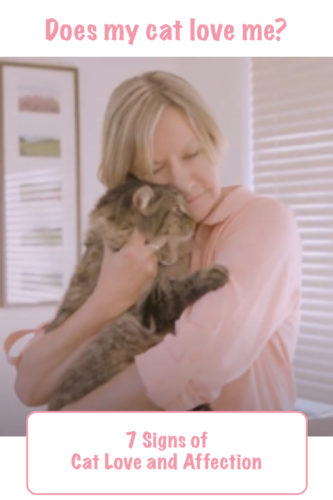
More cat behaviour information
- Pets and water sprays: No way!

- Cats use of litter box is determined by sight, not scent

- How to Keep Pets Calm in Stressful Situations

- Australia’s cats kill 650 million reptiles a year!

- Ask Dr Jo – Your Cat Q&As (With adorable Cats to watch!)

- Top 10 Problem Pets – and Problem Pet Behaviour


